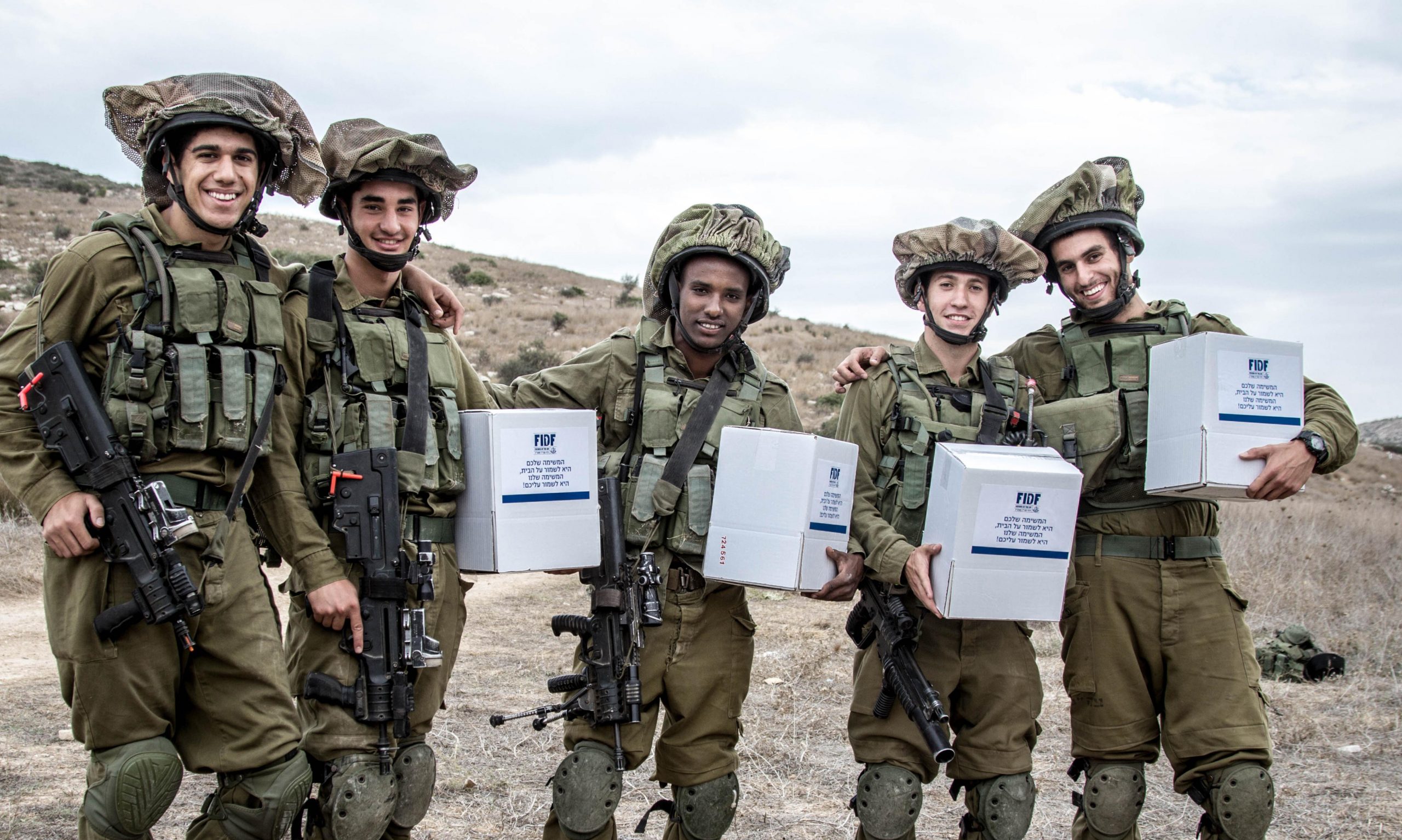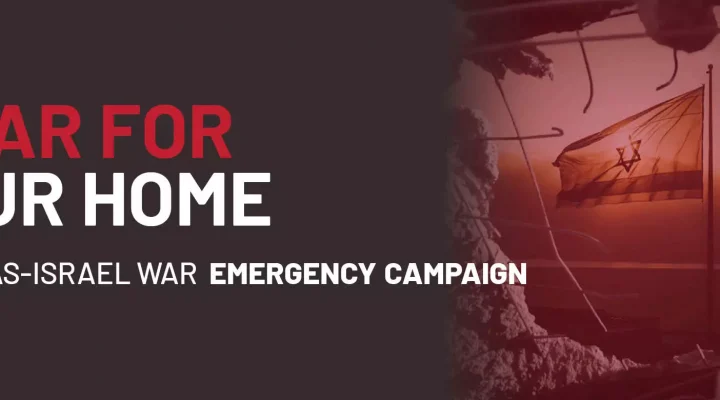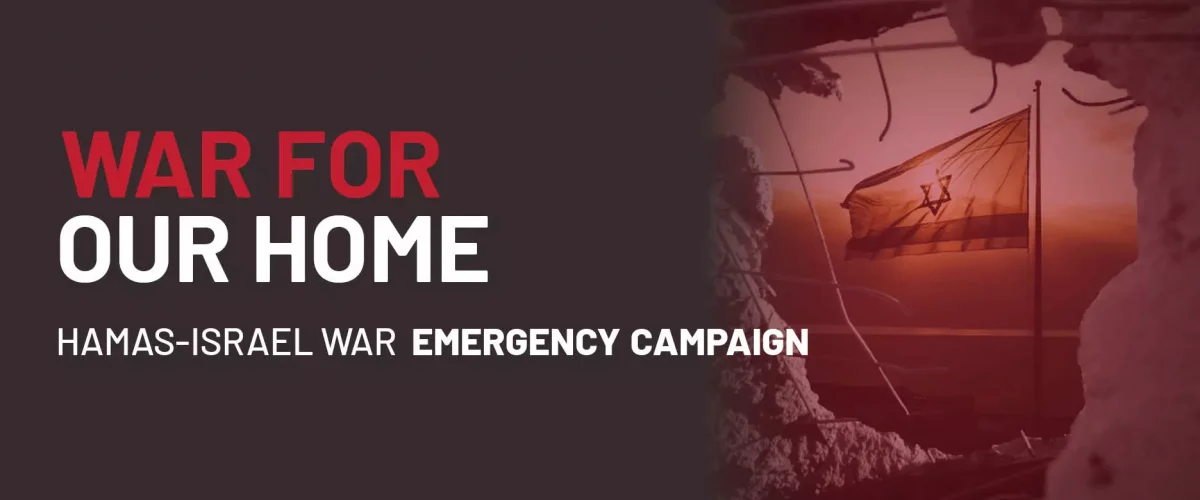As Israel Defense Forces have killed more than 20,000 people in Gaza and wounded another 50,000, a U.S.-based nonprofit seeks to “raise $50 million to address the severe humanitarian needs and the well-being crises that will inevitably ensue for IDF soldiers.”
Friends of Israel Defense Forces sent out a news release Dec. 27 touting its recent charter of two 757 airplanes to deliver “$10 million worth of materials for Israeli soldiers.”
“It is hard to imagine the magnitude of Israel’s 169,500 active military suddenly adding and equipping another 360,000 troops,” the news release said. “That’s coats, boots, gloves, bulletproof vests, and everything else, things that were needed but not available. So the IDF went out without these supplies.”
But one thing is definitely not needed, a “Fast Takes” information sheet explained: weapons.

2006 photo of an Israeli soldier supplied in news release from FIDF.
“The IDF does not need military equipment,” the information sheet said. “They are not accepting donations from other U.S. organizations claiming to raise funds for military equipment. Equipment is being delivered via the IDF to units according to missions and requirements. The IDF outfits its soldiers with all military equipment necessary to perform their duties to protect the State Israel. This includes the thousands of reserve soldiers being called up to duty to help with Operation Swords of Iron. Reservists are equipped in the order in which they will be deployed, and they will NOT under any circumstance be deployed into combat without the proper equipment.”
Except for coats, boots, gloves and bullet proof vests — which Friends of the Israel Defense Forces says it is shipping to them.
FIDF is a registered nonprofit based in New York. According to Charity Watch, it typically routes 76% of its income to the stated causes for which it raises funds. The Dec. 27 news release said: “100 percent of funds raised by FIDF during the operation are going straight to meet these urgent needs of the soldiers.”
The U.S. remains Israel’s staunchest ally even as global criticism mounts about the severity and indiscriminate nature of Israel’s attacks on ordinary Palestinians in Gaza in an attempt to root out leaders of Hamas, the terrorist group that launched a surprise attack on Israel Oct. 7.
While FIDF raises $50 million to help Israeli soldiers conscripted into military service, 2 million Palestinians are starving and homeless because of the Israeli soldiers’ attacks.
“Through our daily communication with the IDF, we understand their greatest needs recognize that these essentials can make all the difference for combat soldiers, who are making the most incredible sacrifices during this war,” said Steve Weil, chief executive officer of FIDF. “As the IDF’s sole designated partner in the U.S., FIDF prioritizes every single request, and we are grateful to our generous supporters who allowed us to fulfill this and every other IDF need.”

Israeli soldiers with FIDF support boxes in hand.
The news release included photos of smiling Israeli soldiers, some with the aid boxes sent by FIDF.
“Now, more than ever, it is imperative that we stand firmly beside our soldiers, who are Israel’s only hope to reinstate security within its borders,” the Fast Facts sheet said. It also says: “Needs of the soldiers will continue to evolve as the war progresses. We are gearing up to fund a robust array of emotional and physical therapy for soldiers, their families and families of the bereaved.”
By the end of October, FIDF reported raising more than $60 million for its emergency campaign to help Israeli soldiers. An earlier news release from the nonprofit said it had donated “plasma for 1,700 soldiers; emergency medical equipment; 70 operational ambulances; … hygiene kits for more than 21,500 soldiers; … refurbishment of hospital waiting areas for wounded soldiers; … food for 20 families in financial need for the duration of their shiva; … personal well-being kits for more than 60,000 combat soldiers.”
FIDF is well-known for its lavish and effective fundraising, allowing the organization to amass $200 million in assets.
A story in The Nation detailed a late-November gala in New York City where drunken revelers donated funds to help Israeli soldiers:
Pop music blasted so loudly that the whole room vibrated. Throngs of young professionals in their finest suits and ball gowns cheered, danced and stumbled around drunk. There were balloons hanging from the ceiling, a photo gallery projected on massive screens, even a huge ice sculpture.
The scene resembled nothing so much as a rich kid’s rowdy bar mitzvah — only this one had a very specific theme. The photo gallery was showing pictures of Israeli soldiers. The ice sculpture was a life-size depiction of a saluting soldier. The balloons were blue and white, the colors of the Israeli flag.
That’s because these people weren’t there to celebrate a newly minted teen. They had gathered — in what turned out to be the final hours of the temporary cease-fire between Israel and Hamas — to party and raise money for the Friends of the Israel Defense Forces, a New York–based nonprofit dedicated solely to supporting the Israeli military.
FIDF isn’t the only U.S.-based charity raising funds for Israel and its soldiers. There are dozens of such charities, each raising multiple millions in donations.
According to an Oct. 30 report in the Jerusalem Post, “the Jewish Federations of North America announced it surpassed the $500 million benchmark and raised $550 million for Israel, due to war with Hamas.”
And Christianity Today reported Oct. 30 that evangelical Christians are breaking records in giving financial support to Israel in its war against Hamas waged among the citizens of Gaza.
CT reported:
The International Christian Embassy Jerusalem has received millions in donations since the war broke out, more than any other two-week period in its history.
Christians United for Israel, which calls itself the largest pro-Israel organization in the US, sent $1 million to fund first responders within days of the October 7 barrage and continues to fundraise.
And The Joshua Fund, founded by Christian author Joel Rosenberg, has collected over $685,000 in donations. The organization is operating 21 aid distribution centers, delivering pallets of toilet paper, bottled water, and other supplies.
“We’ve had literally thousands of new donors, and giving to our Rapid Response Fund has never been greater,” said executive director Carl Moeller. “So many of our donors just want to know how to pray — and to let people over there know that believers in the U.S. are praying and giving to meet their needs.”
Related articles:
If you’re uncertain how to approach Israel and Gaza, start with grief | Opinion by Cody Sanders


